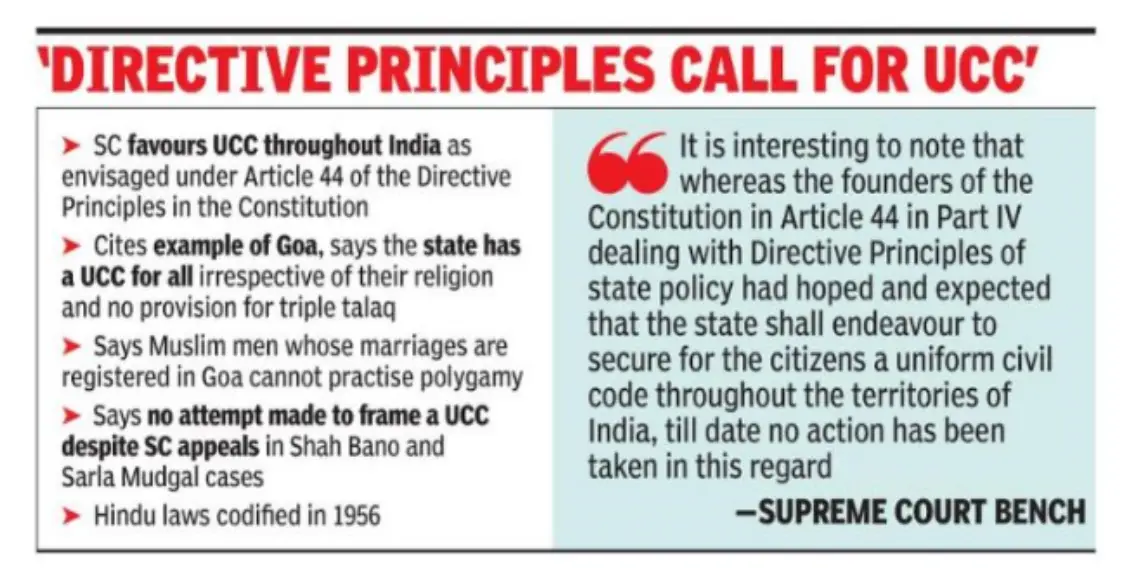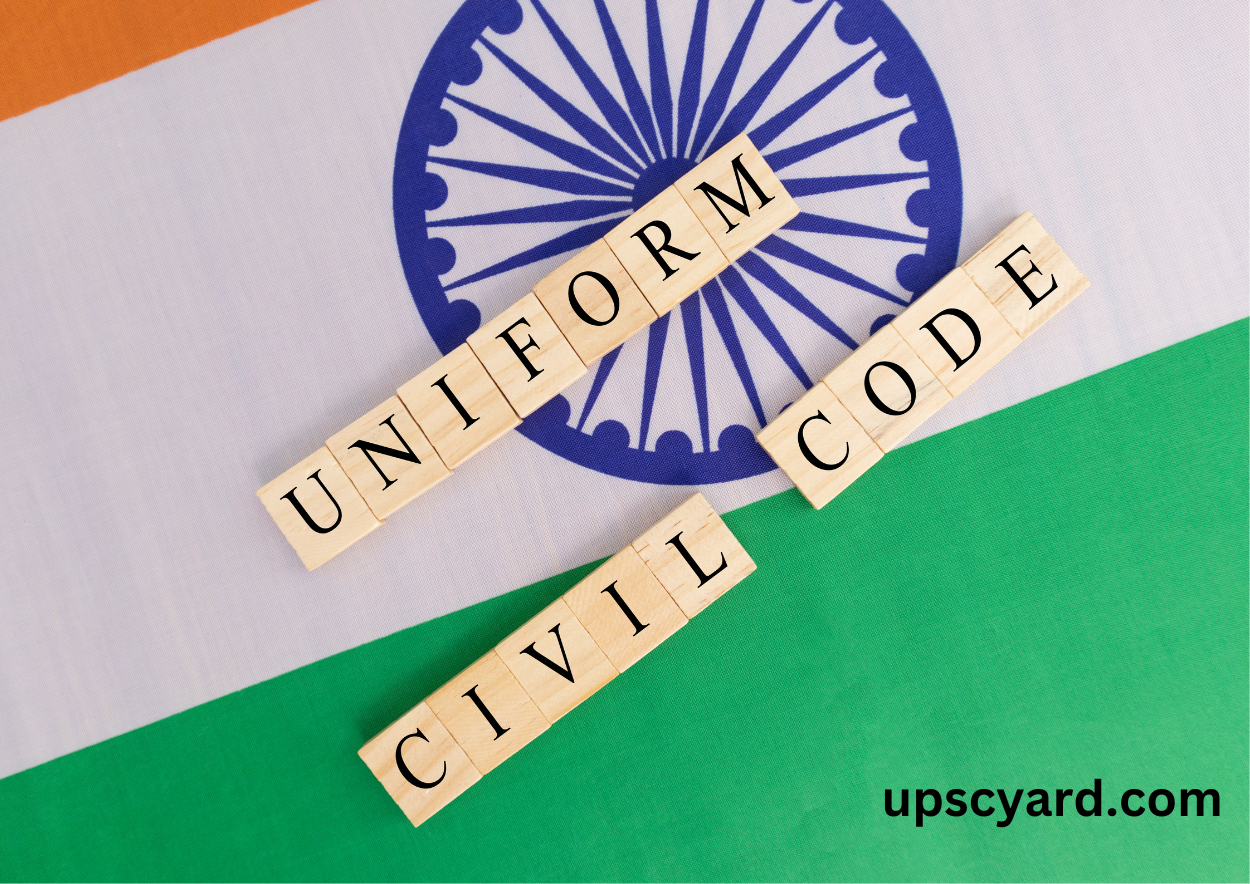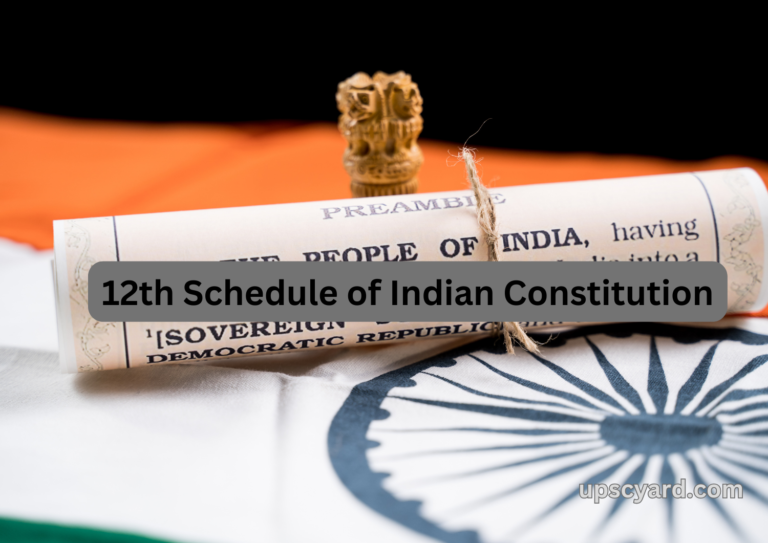It involves the creation of a single law that would be universally applicable to all religious communities within India, covering aspects such as marriage, divorce, inheritance, and adoption. The concept of a Uniform Civil Code aligns with a unified legal framework for the entire nation, regardless of religious affiliations.
The Law Commission of India has actively sought input and proposals from the public concerning the Uniform Civil Code UPSC. The UCC has been a subject of extensive debate and political controversy in India, with the Law Commission having previously expressed that it was neither necessary nor advisable.
Uniform Civil Code UPSC
Recent update
The Law Commission of India has initiated a fresh round of consultations on the Uniform Civil Code (UCC), commencing on June 14, 2023. They have actively sought input from the general public and recognized religious institutions. Individuals and organizations have a 30-day window from the date of the notice to provide their feedback and suggestions to the commission.
The 22nd Law Commission decided to revisit the topic, as more than three years have elapsed since the initial release of the consultation, as mentioned earlier in the paper.
About Uniform Civil Code UPSC

The concept of the Uniform Civil Code UPSC (UCC) was initially proposed by the then Prime Minister, Jawaharlal Nehru and Dr B.R Ambedkar pushed for a uniform civil code. . It seeks to establish a standardized set of personal laws that would apply uniformly to all citizens of the nation. These personal laws encompass various aspects, including property, marriage and divorce, and inheritance and succession.
Personal laws are legal provisions that pertain to specific groups of people based on their religion, caste, faith, and beliefs. These laws are formulated after careful consideration of customs and religious texts.
The primary objective of the UCC is to replace the personal laws that are currently based on the religious scriptures and customs of different communities in India with a uniform set of governing laws that apply to every citizen.
The origins of the UCC can be traced back to colonial India when the British government, in 1835, emphasized the necessity of standardizing Indian law related to crimes, evidence, and contracts. It specifically recommended excluding the personal laws of Hindus and Muslims from this codification.
Efforts were later made to improve the conditions of Hindu widows through various law reforms until 1947. Subsequently, in 1956, the Indian Parliament passed the Hindu Code Bill, which reformed Hindu personal law, granting women greater property rights and ownership, particularly in their father’s estate.
Status Quo – Uniform Civil Code UPSC
In India, various aspects of an individual’s personal life, including marriage, succession, and divorce, are currently regulated by different personal laws, such as Hindu, Sharia, and Christian. These laws are deeply rooted in the customs and practices of the respective religions.
For instance, the Hindu Marriage Act governs marriages between Hindu individuals, while the Muslim Marriage Act and Christian Marriage Act oversee marriages involving Muslim and Christian individuals. Depending on the specific Act under which a marriage is registered, the legal processes for divorce, succession, and related matters are determined accordingly.
Article 44 of the Indian Constitution, a component of the Directive Principles of State Policy, explicitly states, “The State shall make an effort to establish a uniform civil code for all citizens throughout the territory of India.” This article underscores the aspiration for a uniform set of civil laws that would apply consistently to all citizens, irrespective of their religious affiliations.
Some important Cases
1. The Sarla Mudgal Cases
This issue become the central question revolved around the permissibility of a man, married under Hindu Law, converting to Islam, and entering into a second valid marriage.
The court’s verdict clarified that a marriage conducted under Hindu Law could only be legally terminated based on the grounds specified in the Hindu Marriage Act.
Converting to Islam and entering into a second marriage did not automatically dissolve the initial Hindu marriage. Consequently, the second marriage would be deemed an offense under Section 494 of the Indian Penal Code (IPC), violating the legal framework governing marriage in this context.
2. Shah Bano Case
This landmark case stands out as a significant moment in the history of Indian personal law.
The central dispute revolved around the entitlement of a Muslim woman to receive maintenance following a divorce, as stipulated by Sharia Law (for 90 days, referred to as iddat). This was compared against the rights granted to all Indian women under Section 125 of the Criminal Procedure Code (CrPC) concerning maintenance.
The Supreme Court ruled in favor of providing maintenance to Muslim women under the CrPC. However, the government later took steps to exempt Muslim women from the provisions of the CrPC, thereby making this legal framework inapplicable to them.
3. The Daniel Latifi Case
The central question at hand revolved around the possibility of a man, married under Hindu Law, converting to Islam, and entering into a second legally valid marriage.
The Court’s ruling emphasized that marriages under Hindu law can solely be dissolved based on the grounds stipulated in the Hindu Marriage Act.
Converting to Islam and entering into another marriage would not automatically dissolve the first Hindu marriage. Therefore, such a second marriage would be deemed an offense under Section 494 of the Indian Penal Code (IPC).
Existing uniform codes within civil laws
These include acts such as the Indian Contract Act, Civil Procedure Code, Sale of Goods Act, Transfer of Property Act, Partnership Act, and Evidence Act, which uniformly govern various aspects of civil matters. However, it is important to note that states have introduced numerous amendments over time, leading to diversity in certain areas even under these secular civil laws. For instance, recently, several states opted out of the Uniform Motor Vehicles Act of 2019, indicating the divergence within the country.
It is worth highlighting that Personal Laws fall under the Concurrent List rather than the Union List in the Indian Constitution. Consequently, the Central Government has limited authority regarding enacting and enforcing a uniform code across all states.
Goa Civil Code
The Goa Civil Code stands out as a unique example in India. It is the sole state to have a Uniform Civil Code, which essentially takes the form of a shared family law, continuing to recognize the Portuguese Civil Code. Here are some notable features of this code:
- It is regarded as a progressive law that promotes the equal distribution of income and property between spouses and children, regardless of gender.
- The code mandates the compulsory registration of every birth, marriage, and death.
- Provisions for divorce are detailed within the code, making legal procedures available.
- For Muslims with marriages registered in Goa, the code prohibits practices like polygamy and the use of Triple Talaq for divorce.
- In marriages, both commonly hold all property and wealth acquired by either spouse.
- Parents can only partially disinherit their children; at least half of the property must be passed on to the children, equally shared among them.
Despite its progressive aspects, certain drawbacks are associated with the Goan Uniform Civil Code, including specific conditions under which Hindu men may have the right to bigamy.
What is the Need For Uniform Civil Code UPSC
Enhancing Women’s Rights: Implementing the Uniform Civil Code (UCC) in India would significantly improve women’s conditions. Despite outward progress in the 21st century, Indian society remains internally patriarchal and, in some instances, misogynistic. Outdated traditional practices persist, subjecting Indian women to subjugation and mistreatment. UCC seeks to challenge these archaic traditions that have no place in contemporary society, advocating for fair treatment and equal rights for women.
Promoting True Secularism: Currently, India practices selective secularism, meaning that it varies in different areas. Uniform Civil Code aims to establish a uniform set of rules that apply to all citizens regardless of their religion, similar to how traffic rules are universally applied. UCC does not intend to limit individuals’ freedom to practice their religion but to ensure that everyone is treated equally under the law.
Ensuring Equality for All: Personal laws are based on specific religions, leading to disparities. For example, Muslims can marry multiple times, while individuals from other faiths may face legal consequences. Uniform Civil Code strives to create a level playing field by ensuring everyone adheres to the same rules, promoting equality among all citizens.
Progressive Nation Building: Embracing and implementing the Uniform Civil Code is a significant step toward transcending caste and religious politics. India stands at a pivotal juncture, moving towards becoming a progressive nation that combines modernity with tradition. Uniform Civil Code can propel society forward and lead India towards becoming a united and developed nation.
International Practices on Uniform Civil Code UPSC
Nations such as China, Germany, the United Kingdom, France, Japan, Israel, Russia, the United States, and the European Union have achieved and sustained their strength and growth by fostering a strong sense of unity, a quality that we are still in the process of cultivating and promoting.
Even in Islamic countries, there is a prevalent practice of implementing uniform laws rooted in Shariah, which apply to all individuals, regardless of their religious beliefs. For instance, countries like Saudi Arabia, Turkey, Egypt, Malaysia, Nigeria, Pakistan, and many others have embraced this approach.
Merits
- Encourages Unity
- Fosters National Pride
- Promotes National Integration
- Reduces Personal Law Litigations
- Counters Communal & Divisive Forces
Drawbacks
- Challenges in Implementation Due to Diversity
- Resistance from Communities to Adoption
- Concerns about State Interference in Personal Matters
- Societal Reluctance towards Altering Personal Laws
- Balancing Human Rights and Social Obligations is Complex
Analysis of Uniform Civil Code UPSC
The Uniform Civil Code (UCC) is driven by the goal of fostering harmony among India’s diverse populace. It recognizes that varying inheritance and other legal systems contribute to disparities among the country’s people, necessitating a uniform set of regulations under the UCC.
This concept is reminiscent of the Succession Act, which draws inspiration from Roman and English legal systems. The UCC seeks to encompass nearly every facet of human relationships. Its primary objectives include safeguarding vulnerable segments of society, such as women and religious minorities while nurturing a sense of nationalism through unity. When enacted, the UCC will simplify the existing intricate legal landscape, which is currently fragmented along religious lines, including the Hindu Code Bill and Shariat law.
The UCC will streamline complex regulations governing marriage ceremonies, inheritance, succession, and adoptions, making them uniform for everyone. Consequently, the same civil law will apply to all citizens, regardless of their religious beliefs.
Conclusion
In a diverse and pluralistic society like India, where people hold steadfast to their respective religious beliefs stemming from various faiths, the framers of the Constitution grappled with the challenge of uniting and harmonizing a populace characterized by diverse religious convictions, distinct castes, creeds, and subgroups, as well as the use of various languages and dialects across different regions. Consequently, they laid the foundation for a secular Constitution to unify all segments of society.
The directive principles enshrined in the Constitution acknowledge this diversity and promote a sense of commonality among individuals of different faiths. Hence, implementing a uniform legal framework is highly advantageous for fostering national unity and integration.




